

|
Back to |
| The Front Page |
| News & Features |

|
Egypt 1, 2, 3, 4 |
|||||||
|
text and photos by Bob Alman layout by Reuben Edwards Posted February 22, 2002
|
|
||||||
It was the first world championship to be held at the new 10-acre, 12-lawn Center, largest croquet venue in the world. It was the first Golf Croquet World Championship with all the top players in the world in both Golf Croquet and Association Croquet competing together. It was the largest field ever for this championship - 56 players in all. All the block events and the playoff were in 13-point best-of-three matches, so more games were played in this championship, by far, than in any other.
The final match of the 2002 Golf Croquet World Championship was expanded to a best-of-five format. It took five hours for former World Champion Khaled Younis (1996, 1998) to defeat the reigning world champion Salah Hassan (1997, 2000). The match started at 1:00 PM on February 17 in front of perhaps the biggest crowd of spectators to see a crqouet tournament in Florida. By the time it ended, barely before sundown, the crowd was considerably smaller. The once and future champion started out badly, but recovered his cool by game #4. The match score was 4-7,7-4,5-7,7-5, 7-5.
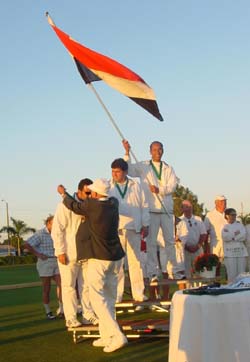
|
| From the winner's tier, three-time champion Khaled Younis holds high the Egyptian flag, just above teammates who took the silver and bronze. |
Eliminating the Reggie threat
But it was the Saturday quarterfinals the day before that were, to many, the climax of the championship. That was when the last non-Egyptians were eliminated from contention - American Ihab Abdelwahad, and South African Reg Bamford, ranked Number One in the world in Association croquet. Bamford, as it turns out, finished the highest of all the non-Egyptians in the event, in fifth place.
Everyone knew the significance of the Bamford/Younis contest, not least of all the Egyptians. It would help to settle the critical issue: whether the top players of Association Croquet could be just as successful playing Golf Croquet at the highest level. The contest was too close, as it turns out, to settle the issue definitively. Younis won both games in the best-of-three match on the last wicket - played as a repeat of #3 in the official WCF rules.
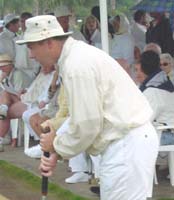
|
| Reg Bamford of South Africa, ranked number one in the world in Association Croquet, was considered the most likely non-Egyptian to win the championship. He placed fifth. |
But Bamford will be back. He told me in a private interview that he loves the game, he sees in it the future of the sport. He knows his lack of experience in the tactics of the game is his major problem,. and he's going to remedy that. He intends to play a lot more golf croquet. Expect to see him going for the gold in the next Golf Croquet World Championship.
Flashback: how the championship came to Florida
If you do a WCF world championship "by the book" - and the WCF quite literally has a thick booklet that tells you everything you must do to bid for and manage a world championship event and a lot of other things you really SHOULD do - that book says you should have the agreements signed and sealed a full two years before the event happens.
For the 2002 Golf Croquet World Championship in West Palm Beach, that timespan was shrunk, by necessity, to nine months. During a whirlwind visit to the United States of WCF president Tony Hall in May of 2001, the essential agreements between the WCF and the National Croquet Center were settled and confirmed. The circumstances seemed providential for both entities. Golf Croquet was and is the most prominent feature of the Center's public profile. A 2002 world championship for golf croquet had never materialized, and this glamorous event would be perfect to celebrate the opening of the Center, projected for completion by October, 2001.
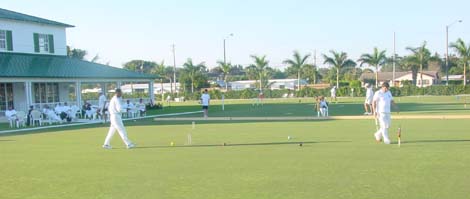
|
| Hassan and Younis survey the layout of the balls on the center of the court shortly before the final shots of the championship. |
November dates were discussed, but a more prudent course was settled upon - having the event in February 2002 instead of the prior November, to make sure everything would be ready.
As most people are by now aware, the Center was not complete by February and is still not complete to this date. (The architect is talking now about weeks, however, instead of months.)
Except for disappointed expectations, it was quickly obvious to all that the clubhouse was not necessary to stage a world-class event. The twelve lawns were here, the commodious Festival tent was in place, and the adjacent 40' by 100' utility building had all the essentials, including office space and restrooms.
What worked, what didn't work, and what was learned
Despite weak refereeing and some terrible weather, the first world championship at the National Croquet Center appears to have gotten generally good marks all around. About 25 people attended the players' meeting on Saturday afternoon before Sunday's final on the veranda of the clubhouse to "debrief" the event. Most of the players were generous in their comments, although there was some discussion of the importance of having well-trained referees and ballboys. One player commented that it was better to have none at all than to have poorly trained ones.
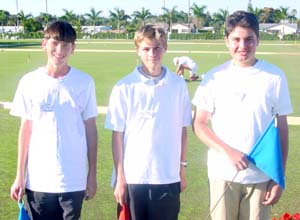
|
| Getting ball boys during the school week proved to be impossible in Palm Beach County, but these three boys from nearby Forest Hill High cheerfully put in two full days of service on finals weekend. |
There was considerable discussion of the wicket settings. Despite new settings every day and considerable adjustment throughout the day on all 10 (and sometimes 12) lawns in play, the wickets were often wider and looser than they should ideally be in this hard-hitting game. One fact had to be acknowledged: that most "good" courts in the US are sand-based, and there's no way they're going to hold up under the pounding of the Egyptians. No wicket designed presents a practical solution to this problem.
No one suggested that an unjust result was about to be achieved, however, and certainly not the Egyptians, who by that point had it nailed down, with countrymen in all four finishing spots.
The press coverage was good, but...
Although the press releases emphasized the significance of the event from a croquet player's point of view, that point of view - despite being hammered repeatedly - did not get across to the public through the media. I personally believe that "the story" is about the recreation of the sport around the promotion and growing popularity of Golf Croquet, combined with the world's finest showcase facility for the sport. This point of view was made forcefully in each press release - by emphasizing the speed of the hit balls, the six-inch wooden boundaries to protect players and spectators from balls hit up to 40 mph, the presence of many countries competing in a fast-moving form of the sport unknown to the public, the dominance of Egypt in Golf Croquet, etc., etc. The significance of this "new and different" form of croquet almost entirely escaped notice of the press. For the most part, their angles were (1) serious croquet (2) a world championship in Palm Beach County, and (3) a big new croquet venue.
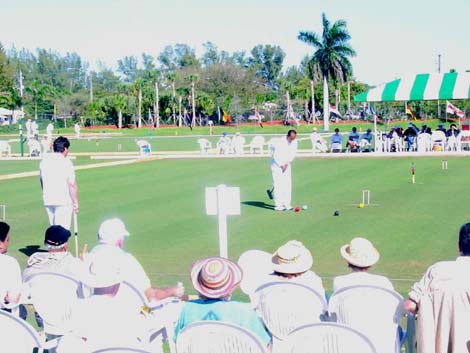
|
| At the beginning of the final match, several hundred people watched motionless in respectful silence as the Egyptians contested each wicket of the 13-point course. |
One positive note: Even thought the coverage was light-weight, it was also honest; there was no poo-pooing of the sport; and in fact, it was covered in some instances by the sports editors and writers, not just the "feature" or "lifestyle" departments.
But there was not a glimmer of national coverage, so far as I know. Both the Sunshine Network and ESPN were polite. They pointed out that the Winter Olympics, the Daytona 500, and the Miami Boat Show were all going on at the same time and held more interest for the public. No argument there.
It was a difficult and costly production. There was a severe scarcity of well-trained referees. There were no ball-boys, except for the final two days. There was some terrible weather. Was it worth it? For the Center, for the WCF, and for the players, it was worth it. If anyone was sorry they came, I haven't heard about it yet. The event was good for the Center, and the game is good for the future of the sport. Even the continued dominance of the Egyptians can be given a positive spin: it inspires the other countries to work harder developing and promoting the game, hoping to knock off the Egyptians in 2004.
For the record, here's the finishing order
It's an individual championship, but nationality always seems to play a central role. There were eight Egyptians in the top sixteen; five Americans; one English; one South African; and one Italian. Here is the finishing Order for the 2002 WCF Golf Croquet World Championship.
1 Khalid Younis - Egypt 2 Salah Hassan - Egypt 3 Walid Salah - Egypt 4 Yasser Esmat - Egypt 5 Reg Bamford - South Africa 6 Sherif Abusbaa - Egypt 7 Paolo De Petra - Italy 8 Ihab Abdelwahab - USA 9 Ahmed El Mahdi - Egypt 10 Sherif Abdelwahab - USA 11 Stephen Mulliner - England 12 Mohamad Kamal - USA 13 Hisham Abdelgawad - Egypt 14 Mohammed Anan - Egypt 15 Richard Knapp - USA 16 Jacques Fournier - USA 17 Sherif Nafee - Egypt 18 Bill Martin - USA 19 Evan Newel - Ireland 20 Shereen Hamdy - Egypt 21 Robert Fulford - England 22 Charles von Schmieder - Ireland 23 Don Beck - England 24 Mik Mehas - USA 25 Bill Berne - USA 26 Roy Gee - USA 27 Andrea Pravettoni - Italy 28 Bill Arliss - England 29 John Moore - England 30 Owen Edwards (tie) - Australia 30 Norman Eatough (tie) - Switzerland 32 Edoardo Lualdi - Italy 33 Tom Weston 34 Salib Erian 35 Bill Mead 36 Ivor Brand 37 Mark Najarian 38 Chris Sheen 39 Derek Old 40 Jim Houser 41 Tony Hall 42 John Jeffrey 43 David Underhill 44 Alexander Kirsten 45 Roy Ware 46 Len Canavan 47 Ken Shipley 48 Gianni Leoncini 49 Peter Just 50 Adelat Shourab 51 Kevin Ham 52 Dick Brackett 53 Rana Alalami 54 Marion Hof 55 David Bent 56 Hassan Ghoneim